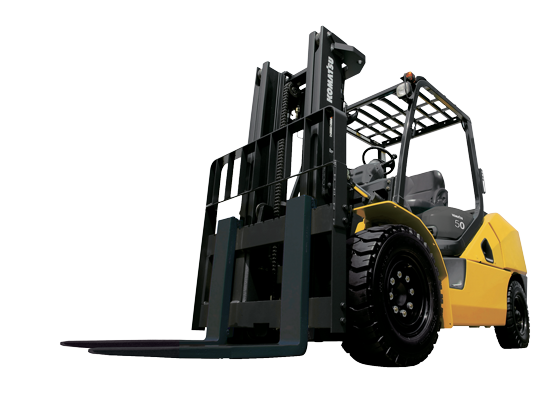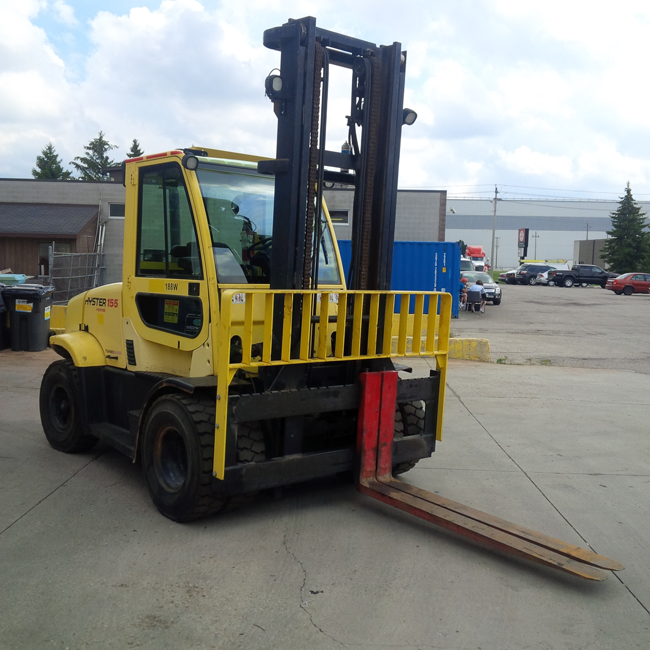Advantages of Pneumatic Tires for Your Forklift
If you are in the market for a new forklift and you are wondering what are the advantages of pneumatic tires, here's a breakdown of the pros and cons. Pneumatic tires cost a bit more than other types of tires, but they do have some distinct advantages that just might make the extra cost worth it. Also, it is important to choose the right tire for the right type of application.
If you are looking for some advice on what type of tire would suit your particular purposes best, talk to the professionals at ForkliftHub. Our staff has the experience and the knowledge to answer any of your questions and we carry a large lineup of quality new and used forklifts to fit your budget and your unique needs.
What Are Pneumatic Tires?
You may have heard the term "pneumatic" tires before, but are not sure exactly what that is. Pneumatic tires are found on high-capacity, all-terrain, and industrial forklift trucks. There are actually two types of pneumatic tires: solid or filled with air.
Air-Filled: An air-filled pneumatic tire has an airtight inner core filled with pressurized air and covered by a tread that is usually reinforced with steel belting or other materials.
The inside pressure of the tire is greater than the outside air pressure, which means that the tire will stay inflated even with the heavy weight of the vehicle pressing down on it. You can easily recognize an air-filled pneumatic tire because it will have a valve where you can fill it with air. Cushion tires don't have a valve.
Solid: Solid pneumatic tires are made of solid rubber or sometimes filled with foam instead of air. This makes them more puncture-proof than air-filled tires, but they don't give you as smooth of a ride.
There are two types of pneumatic tires - air-filled and solid
Advantages of Pneumatic Tires
More Durable:
Pneumatic tires are made out of very durable rubber and are constructed with a deep tread that makes them more durable than cushion tires. Their thick rubber makes them a great choice for harsh conditions and uneven surfaces.
Easily Interchangeable:
Pneumatic tires are made with two sets of bolts on the inside of the rim. One set locks the rim onto the axle and the other set locks the wheel to the rim. This design means that they are easily interchangeable.
Smoother Ride:
Air-filled pneumatic tires are filled with air, which cushions your ride and will give you a smoother overall operating experience. The air helps to absorb the bumps when going over potholes, obstructions, and bumps, making a much more comfortable ride for your operators. This cushioning effect will also help to lengthen the lifespan of your forklift as it will protect your trucks from the hard, constant jarring of the terrain.
Air-filled pneumatic tires give you a smoother ride over bumpy, outdoor surfaces
Ideal for Rough Terrain:
Because of their deeper treads and great durability, pneumatic tires are wonderful on rough or uneven terrain. Their dense cushioning makes them very effective when working on rough or potholed turf. The air inside a pneumatic tire helps to absorb the impact when going over bumps thus reducing the jarring usually caused by irregular ground. As a result, air-filled pneumatic tires work well in rugged outdoor applications and construction sites.
Choose Between "Bias" Ply or Steel "Radial" Construction:
Depending on what you are using your forklift for, you can choose to use either a "bias" ply or a steel "radial" pneumatic tire. Radials provide a smoother ride, but Bias offers more stability in the sidewall for certain applications. Radials also offer longer tread wear, better traction and flotation, and a smoother ride. However, they are slightly more expensive to purchase than bias. If you consider the total cost of ownership though, you probably will find that radials are less expensive in the long run as they last longer.
Disadvantages of Pneumatic Tires
Cost More Than Cushion Tires:
Pneumatic tires are usually larger than cushion tires and are generally slightly more expensive to purchase. However, because they are more durable and tend to last longer and they tend to make your forklift last longer, pneumatic tires are worth the extra money.
Pneumatic tires may cost more initially, but they do help to prolong the
lifespan of your forklift
Air-Filled Are Prone to Punctures:
The fact that air-filled pneumatic tires are filled with air can be both a pro and a con. The air gives it a smoother ride, but it also means that the tire is more prone to getting punctures and deflating, often at very inconvenient times. You can repair a punctured pneumatic tire. However, you will often find that after the repair, the tire will not perform as well as it did before and it may be less reliable.
Difficult to Get the Right Tire Pressure:
Air-filled pneumatic tires can be very difficult to get just the right tire pressure you need for your application. Variations in air pressure can greatly affect your tire's performance and it is quite tricky to achieve the perfect pressure.
Susceptible to Temperature Changes Causing Poorer Handling:
Because air-filled pneumatic tires are filled with air, their internal pressure can change with a change in temperature. Hotter temperatures will cause the air to expand and colder temperatures will cause it to deflate. As a result, you can experience poorer handling. If your tires deflate, they will flatten slightly meaning that more tread will be in contact with the road.
Less Maneuverability:
Because of their size, pneumatic forklifts usually have a larger turning radius, making them less maneuverable than a smaller cushion tire.
Where Should You Use Pneumatic Tires
If your forklifts are to be working on uneven or rugged terrain, such as gravel or at a construction site, pneumatic tires are your best choice.
You can also use pneumatic tires indoors for extra comfort for your operators, however, if you are working in tighter spaces and require greater maneuverability, you may want to choose a cushion tire.
Try watching this video on www.youtube.com, or enable JavaScript if it is disabled in your browser.
Choose the tire that best suits where and how you will be using your forklift
Sources:
ForkliftHub: For Pneumatic and Cushion Forklifts Plus the Safety Training You Need to Run Them
If you are looking for top-quality forklifts, contact ForkliftHub. We sell the best pneumatic and cushion tire forklifts you can buy and our knowledgeable staff will be able to help you choose the perfect model that will best suit your particular applications. We will be happy to answer all of your questions and we can even provide top-notch safety training for your operators. Contact ForkliftHub today for all of your forklift needs.
ForkliftHub's intense and comprehensive forklift safety training program will provide you and your employees with the best safety training at the best price. This thorough program has a 98% pass rate. We can train individuals or groups at our facility or yours - you choose.
Our Safe Operation of a Lift Truck/Forklift Program is an excellent way for you to ensure forklift safety in your workplace. With our training, you will experience:
• Innovative training practices
• Affordable pricing
• Flexible and professional trainers
• Comprehensive in-class and practical experience
Contact ForkliftHub today to book your next session.





